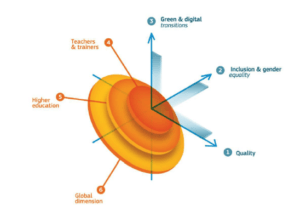Stay in the loop! Subscribe to our mailing list
After a slight disappointment by Ursula von der Leyen not recognising education and research as fundamental to EU’s future sustainability in her State of the Union 2020 speech, the just published Communications on European Education Area (EEA), European Research Area (ERA) and Digital Education Action Plan (DEAP) provide a more detailed insight into future developments in education and training, with a strong focus on internationalisation of higher education and research.
In the Communication on the EEA, internationalisation of higher education is referenced in each of the six thematic areas: Quality, Inclusion & gender, Green & digital, Teachers & trainers, Higher education and global dimension.
In the area of Quality, mobility and cross-border cooperation are recognised as “strong drivers for enhancing the quality of education” bearing in mind a range of obstacles to overcome, such as insufficient information and guidance, language learning and recognition of learning outcomes. To lift the quality in education the Commission plans to accompany the new Erasmus programme by updating the learning mobility framework to address a triple challenge: ensuring opportunities for a much wider variety of participants, green and digital mobility and encouraging balanced mobility.
For internationalisation in the Inclusion & gender theme, cross-border cooperation should be strengthened through a cross-sectoral collaboration between higher education institutions (HEIs) and non-formal learning, youth work, sport and culture.
In further support for Green & digital transitions, virtual and blended mobility could complement physical mobility with green and digital topics supposing to receive priority in cooperation projects. The programmes would streamline the digital dimension within the mobility and cooperation actions and intend to support climate-friendly means of cooperation and project execution. Further incentives to carbon-friendly physical mobility travels would complement the measures.
For enhancing competence and motivation in the education professions, the Commission will roll-out a number of initiatives, most notably Erasmus Teacher Academies to create 25 networks of teacher education institutions and teacher associations by 2025.
In the area of higher education, the success of the Bologna process for internationalisation and mobility is the foundation for experimenting and testing new models of “deeper and more ambitious cooperation” among higher education institutions (HEIs through European University Alliances and a new policy framework focused on connectivity, inclusion and digital and green readiness and resilience. Online public consultation with targeted events will start this year with an aim to initiate the co-creation of a transformation agenda for higher education by the end of 2021. This is where synergies come into play with the ERA communication specifically addressing internationalisation and transformation of Europe’s universities in this regard next to delivering the European Skills Agenda.
In the Global dimension, the communication calls for promoting European interests and values. Reciprocity, level playing field and ethical and integrity standards will be a central part of ambitious partnerships with tertiary education receiving particular attention in this regard. Actions at EU level should be geared towards creating a “Team Europe” approach with greater cooperation with EU Member States on the external activities. Widening the association of non-EU countries to the European Education Area, especially those of the Western Balkans, is an integral part of the vision. The digital aspects of international cooperation are also highlighted in the DEAP in line with the Digital Agenda for the Western Balkans and EU4Digital Initiative in the Eastern Partnership countries.

More about current state of play on digital policies here.